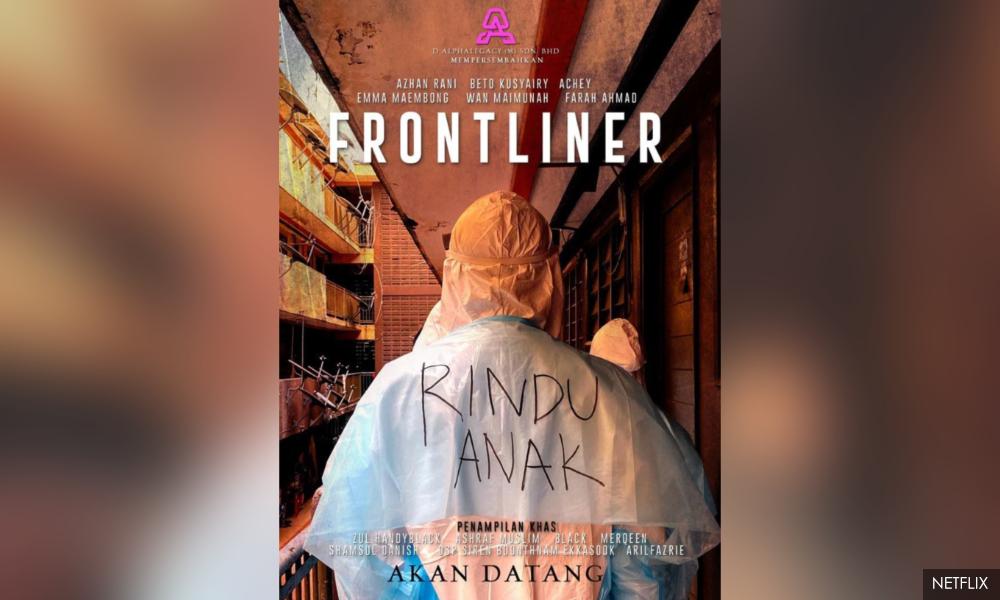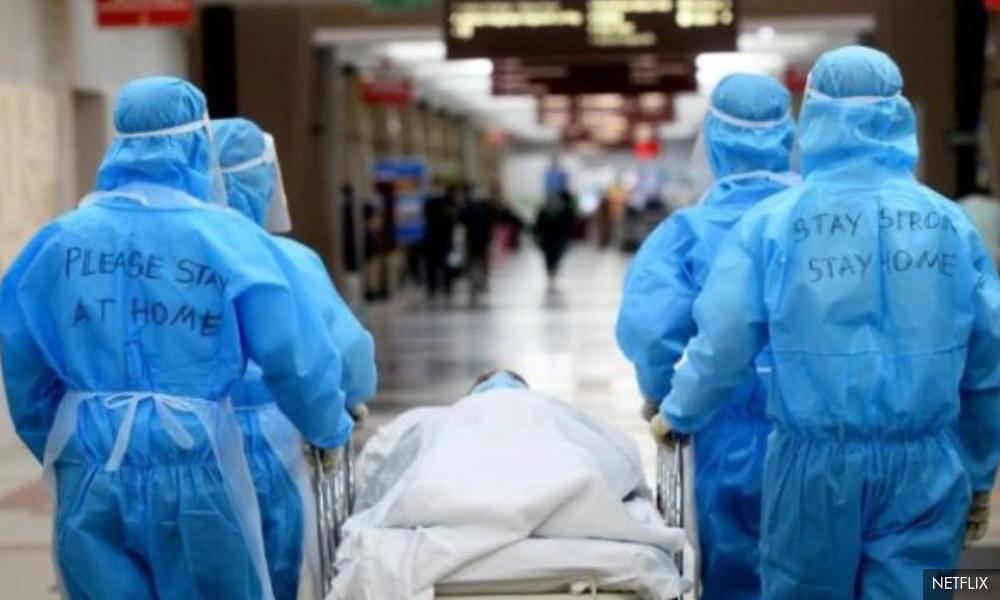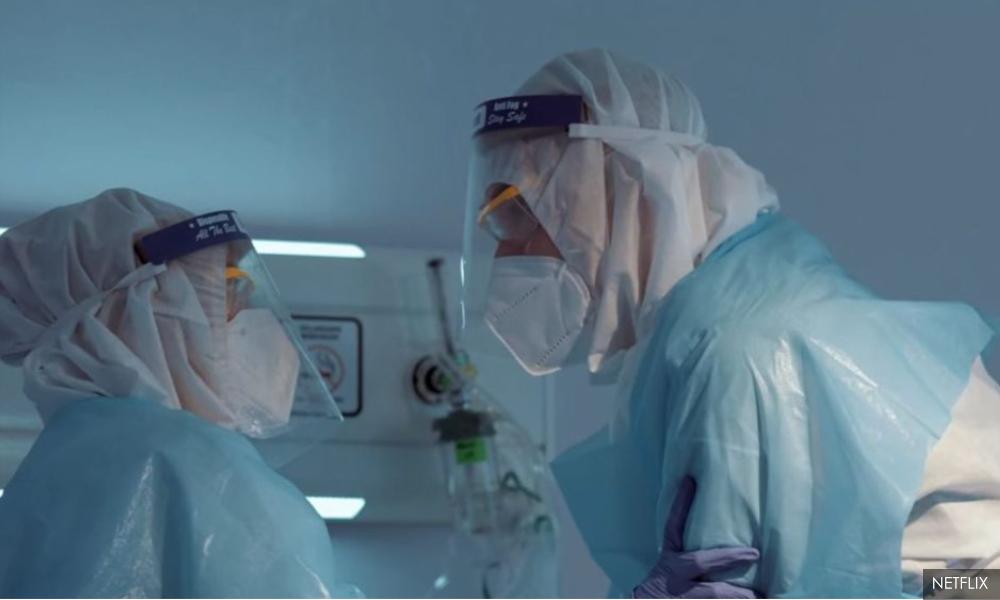If there is a movie that is supposed to be a tribute to frontliners who have been battling the Covid-19 pandemic for the past one and a half years, then the local movie Frontliner that is currently streaming on Netflix is not it.
Directed by Razif Rashid, the movie is about four frontliners - two police officers, a doctor, and a teacher who runs a school of some sort.
The movie is supposed to show the struggles that these people experience during the height of the pandemic.
Beto Kusyairy plays Inspektor Zul - who isn’t really a police officer but from an Agensi Keselamatan Negara (AKN)? He is married to teacher Nadia who is played by Farah Ahmad and they have a teenage son.
Inspektor Zul rarely gets to go home because he is mostly driving around a residential area capturing teenagers who violate curfew and hanging out at playgrounds.
When he does get home, he sleeps in a tent and listens to Nadia talk about how she doesn’t have enough money to pay her teaching staff because parents can’t afford to pay their children’s fees.
Achey Bocey plays Kapten Nasir, Inspektor Zul’s colleague who mainly mans a roadblock on a very empty street.
He constantly has to deal with a sarcastic and passive-aggressive mother who is angry at him for never wanting to come home. She doesn’t seem to take his explanations that he might put her at risk of getting Covid-19 seriously.
Azhan Rani plays Dr Azhan, a doctor who works in a small hospital in a shop lot. He treats Covid-19 patients and rents a house opposite his actual home so that he won’t have to come into direct contact with his wife, Nora who is played by Emma Maembong, who is heavily pregnant.
Spoiler alert. She dies of Covid-19 at the end. It’s okay. It’s not much of a spoiler.
The premise may sound interesting, but do not be fooled. I’m sure that this movie was made with the objective of being a realistic and sympathetic snapshot of these characters and their struggles.

Unfortunately, the stories and characters are shown more like extreme caricatures rather than anything that vaguely resembles reality.
Firstly, all the issues and struggles that are faced by these characters are so general and surface that it reveals nothing intimate or give any new insights.
Sure, they highlight how medical personnel are overworked and exhausted. Of course, they show how enforcement personnel are overworked and exhausted.
But it is just scene after scene of them sitting down, lying down, and looking tired.
It’s basically a derivative compilation of shots that is copying the different photographs of doctors and nurses that we already see being reported every day in the news, and that’s it.
Don’t we all know that already? I was hoping for more intimate stories.
General portrayal of struggles
The movie also deals with the economic struggles of individuals and businesses.
There is one scene of Nadia making calls to parents asking them to settle school fees and a couple of scenes where she expresses to her husband Inspektor Zul that she can pay her staff.
Great! More general descriptions of what we already see in the news on a daily basis.

Stress and mental health is also brought up. Nadia suffers from anxiety and her son is stressed out from being locked up in the house and unable to see his friends.
So, they are just constantly screaming at each other. The son screams at his mother for not letting him go out and the mother screams at the son for not appreciating his father’s sacrifice as a frontliner.
Then, there is that very predictable scene of Inspektor Zul’s subordinate catching his son hanging out at a playground with his friends.
He then has to drive his son back home disappointedly and all the while nagging at him for not appreciating his sacrifice as an AKN officer. Nothing that we couldn’t have already seen happening.
The movie highlights the issue of families being kept apart in the form of Kapten Nasir and his elderly mother.
It is just scene after scene of him telling his mother on the phone that he can’t come home and his mother just constantly guilt-tripping him by saying that he will regret not coming home when she dies one day. Talk about drama minggu ini!
But like I said, the premise may seem to have potential, but unfortunately, the execution of the story and narrative just fails it.

It does no justice to the real-life frontliners who are struggling to keep the country alive. It repeats the issues that we already know and serves no purpose to heighten our appreciation and empathy for them.
And constantly making the characters in the movie repeat lines like “demi negara” and “untuk Malaysia” does not make a film patriotic or nationalistic.
If anything, it just makes it look like the filmmakers are being too opportunistic in trying to milk the emotions of Malaysians and click-baiting them into watching the movie.
There are no deep and meaningful portrayals of the struggles and experiences of frontliners in the movie.
Everything that is shown is just general depictions that could have been told in two-minute TV news packages or a three hundred word inverted-pyramid format news article. In fact, the news stories are probably more revealing.
And in no way am I saying this to knock news reports, because that’s what news reports are - to inform the public of the facts as fast and in as easy a way to understand as possible.
At least the journalists are achieving their objectives. That’s not what I can say for the filmmakers who made Frontliner.
Worst of all, for a movie that claims to tell the story of Malaysian frontliners, it would seem that the Malaysia they portray seems to consist of only Malays. What happened to the Chinese and Indian doctors and nurses? What about the Sabahan and Sarawakian police personnel?
The diversity that this film lacks is shameful.
At the end of the day, Frontliner is worse than mediocre and does no justice to everything that frontliners in the country have done and gone through.
In fact, as a Malaysian who isn’t considered a frontliner, I feel embarrassed to watch the film and even more embarrassed for the film to be seen by anyone. Personally, I would say, give this movie a skip. Our frontliners deserve better. - Mkini
ZAN AZLEE is a writer, documentary filmmaker, journalist, and academic. He had waited so long for a change in the system and he is not willing to settle for a half-past-six change. And then the Sheraton Move happened. Visit fatbidin.com to view his work.
The views expressed here are those of the author/contributor and do not necessarily represent the views of MMKtT.




No comments:
Post a Comment
Note: Only a member of this blog may post a comment.